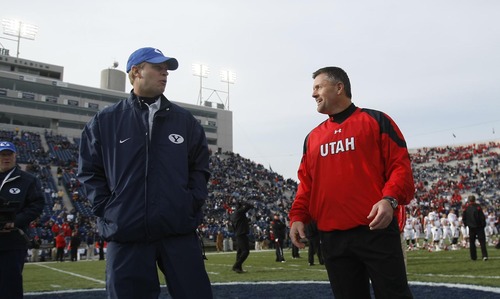This is an archived article that was published on sltrib.com in 2012, and information in the article may be outdated. It is provided only for personal research purposes and may not be reprinted.
A couple of slap-you-upside-the-head trends pointing to failure in losses and success in wins for Utah and BYU football this season are quarterback proficiency and third-down efficiency.
No big surprise. Each is in bad need of overhaul, replacement or repair.
Taking the latter first, in their combined 10 defeats this season, the Cougars and Utes have kept drives alive by converting on third down just 41 of 145 times. In their combined 10 victories, they've converted on third down 78 of 156 times.
Separated out, when Utah wins, it has hit successfully on 28 third downs out of 57 attempts. When it loses, it's 19 of 85. In BYU wins, the Cougars are 50 for 99. When they lose, they're 22 of 60.
That's how significant winning third down is.
A miss might as well be a turnover, with the benefit of a punt or kick. It's unanswerable — but intriguing nonetheless — to wonder how many touchdowns never were because of one botched third-and-3 or third-and-6 somewhere early in an aborted drive.
But it's bigger than just that.
Offenses efficient at third-down conversions typically put themselves in a lot of third-and-shorts, and they do that with smart play-calling in the run-up, by mixing those plays and keeping defenses off balance. It's not a matter of simply erasing mistakes made on first and second downs with an accurate quarterback regularly keeping drives afloat by repeatedly making huge plays. Percentages say third-and-10 is eventual death.
On the other hand, if a team routinely runs on first down and picks up 3 yards, then runs again on second, picking up another 3, it puts a premium on precision consistently converting third-and-4s. One missed block or pass or hole, and the drive is done.
All of which is to say, when teams stumble on third down, it usually means they stumble on first and second. Either the coordinator is doing a lousy job of conjuring the right play at the right time or the players aren't executing the plays properly. Neither breakdown is encouraging.
Overall, BYU ranks 31st in the country in third-down conversions, with a success rate of 45.2 percent. Utah ranks 106th, converting only 33.1. As noted, the Utes have converted nearly half their third-down attempts in their wins, a substantial difference with substantial consequences.
Total first downs reflect similar rankings, with BYU at 33rd nationally (23 first downs per game) and Utah at 106th with an average of 17.4.
Quarterbacking, which has been plain for a blind man to see, is the other rupture.
Utah is 80th in the country in pass efficiency this season. And BYU, which used to be known as Quarterback U., is 88th. Utah is 101st in passing offense, BYU ranks 69th. And, somewhere, bless his soul, Doug Scovil just got sick. Teams such as Idaho and Wyoming and Northern Illinois are better at airing it out than the Cougars. Army and Navy and New Mexico are worse than the Utes, but not by all that much.
In their victories, the Cougars and Utes have completed a combined 67 percent of their passes (BYU 64, Utah 71). In their losses, they've hit on just 55 percent (BYU 53, Utah 56). Together, the QBs have thrown more than twice as many picks (15 to 7) in their losses and 19 touchdown passes versus 12 in their wins. BYU has nailed 13 TDs in victory and only five in defeat.
Even more shockingly, the Utes rank 96th in rushing offense (with the Cougars 51st), but that's a subject for another day, another time.
The good news is that both BYU and Utah coaches would have to be dense not to know, regardless of what is said publicly, where they've screwed up in guiding their programs toward mid-level mediocrity. No matter where the win-loss records end up, or how much spin is put on them, they've got to develop or load in better quarterbacks, become more efficient in play-calling and execution on offense, and remember with exactness, no matter how stout their defenses might be, what it was that made college football such a draw here in the first place.
Gordon Monson hosts "The Big Show" weekdays from 3-7 p.m. on 1280 AM/97.5 FM The Zone. Twitter: @GordonMonson.



